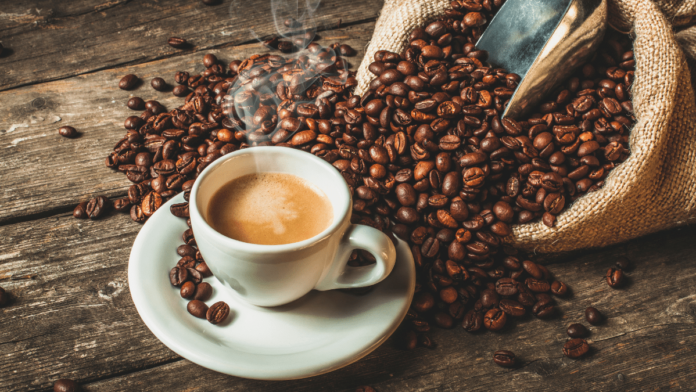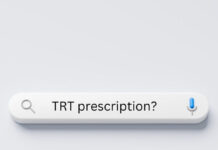[ad_1]
Observe: This text was the MASS Analysis Assessment cowl story for February 2024 and is a evaluate of a recent paper by Marcus et al. If you need extra content material like this, subscribe to MASS.
Key Factors
- The current research examined the consequences of acute caffeine consumption on cardiac arrhythmias, every day step counts, and sleep outcomes in 100 wholesome adults.
- Members took extra steps on espresso days (10,646 steps) than caffeine avoidance days (9665 steps). Nonetheless, caffeine additionally led to much less sleep (36 fewer minutes per night time) and extra every day untimely ventricular contractions (p < 0.05).
- Caffeine isn’t inherently unhealthy or unhealthy, however we nonetheless don’t totally perceive its long-term impression on coaching diversifications and there are many people who find themselves higher off with out it. In case you’re experiencing points that might probably be associated to caffeine (e.g., complications, poor sleep, anxiousness, and many others.), experimenting with caffeine avoidance is perhaps worthwhile.
Caffeine is among the few fitness-related subjects the place the fervour of health lovers is matched, if not exceeded, by most of the people. The curiosity from lifters is comprehensible, as meta-analyses point out that caffeine can acutely improve a wide range of efficiency outcomes together with power and energy (as coated on this MASS video). Curiosity from non-lifters is equally comprehensible, as everybody might use a morning increase of vitality and caffeinated drinks like tea and occasional play a distinguished function in lots of cultures. Roughly 85% of American adults devour a caffeinated beverage every day (2), and a few estimates place their common every day caffeine consumption simply north of 200 mg/day (3). That may sound like lots, however common every day caffeine intakes in Sweden and Finland exceed 400 mg/day (3). To this point, one of many high highlights of my profession has been presenting at an unimaginable train science convention in Finland – having been there throughout a comparatively chilly month, I can vouch for the 400+ mg/day estimate. Espresso was just about at all times inside attain, and as a espresso lover, I used to be in heaven.
Having stated that, many governments advise residents to restrict their every day caffeine consumption to not more than 300-400 mg/day, whereas some warning that every day intakes above 200 mg/day may result in undesirable negative effects like nervousness or nervousness (4). Caffeinated drinks are additionally within the information after two recent lawsuits attributed deadly cardiac arrhythmias to the consumption of a specific product at an American restaurant chain. I wouldn’t dare get between a espresso drinker and their morning dose of caffeine, however we shouldn’t flip a blind eye to caffeine’s potential drawbacks simply because we take pleasure in its most fascinating traits. As a substitute, we must always seek the advice of the proof to find out if the professionals outweigh the cons, and that’s precisely what this text intends to do. Marcus et al (1) not too long ago examined the consequences of acute caffeine consumption on cardiac arrhythmias, every day step counts, and sleep outcomes, so let’s dive in and see what they discovered.
Objective and Hypotheses
Objective
The aim of the presently reviewed research was “to look at the consequences of caffeinated espresso on cardiac ectopy and arrhythmias, every day step counts, sleep minutes, and serum glucose ranges.”
Hypotheses
The researchers didn’t explicitly state a speculation.
Topics and Strategies
The current research screened 113 potential contributors and ended up enrolling 100 eligible adults who consumed caffeinated espresso not less than as soon as per yr. The researchers excluded contributors who had sure coronary heart situations, took sure drugs impacting coronary heart rhythms, or had a medical cause to keep away from espresso. The research was a randomized crossover trial; contributors had been instructed to devour caffeinated espresso or keep away from caffeine in a collection of seven 2-day sequences (on-off or off-on), with the trial lasting 14 days in whole. Every morning, contributors acquired a textual content message informing them of their assigned situation (caffeinated espresso or no caffeine). These assignments had been despatched in a randomized order with two-day sequences to make sure that contributors would by no means go greater than two consecutive days with caffeine or greater than two consecutive days with out caffeine.
The first research final result was untimely atrial contractions, however different outcomes of curiosity included untimely ventricular contractions, arrhythmias, step depend, sleep minutes, and glucose ranges. To measure these outcomes, contributors had been fitted with an electrocardiogram (ECG/EKG) patch, exercise tracker (Fitbit), and steady glucose monitor. The researchers took a number of steps to verify protocol adherence; contributors pressed a button on their ECG patch once they consumed caffeinated espresso, along with finishing surveys, offering receipts, and downloading a geolocation app to verify their presence in espresso retailers. Participant traits are offered in Desk 1.
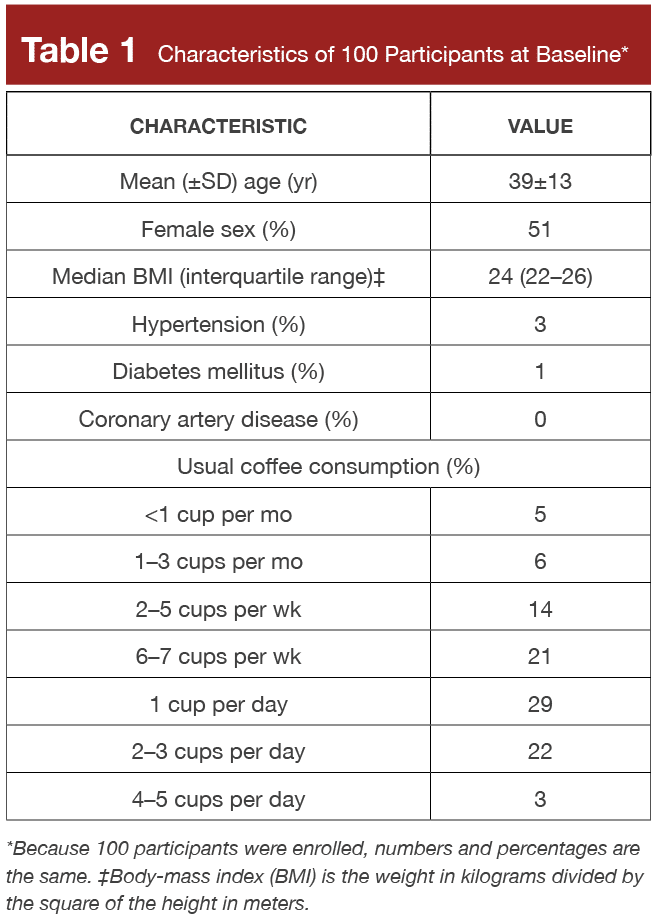
Findings
Members had extra untimely atrial and ventricular contractions throughout espresso days than caffeine avoidance days. This was statistically important for untimely ventricular contractions (p < 0.05), however not for untimely atrial contractions (p = 0.10). These outcomes are offered in Desk 2.


Members took a mean of 1058 further steps on espresso days compared to caffeine avoidance days. This distinction was statistically important (p < 0.05), with a 95% confidence interval starting from 441 to 1675. These knowledge are offered in Determine 1.
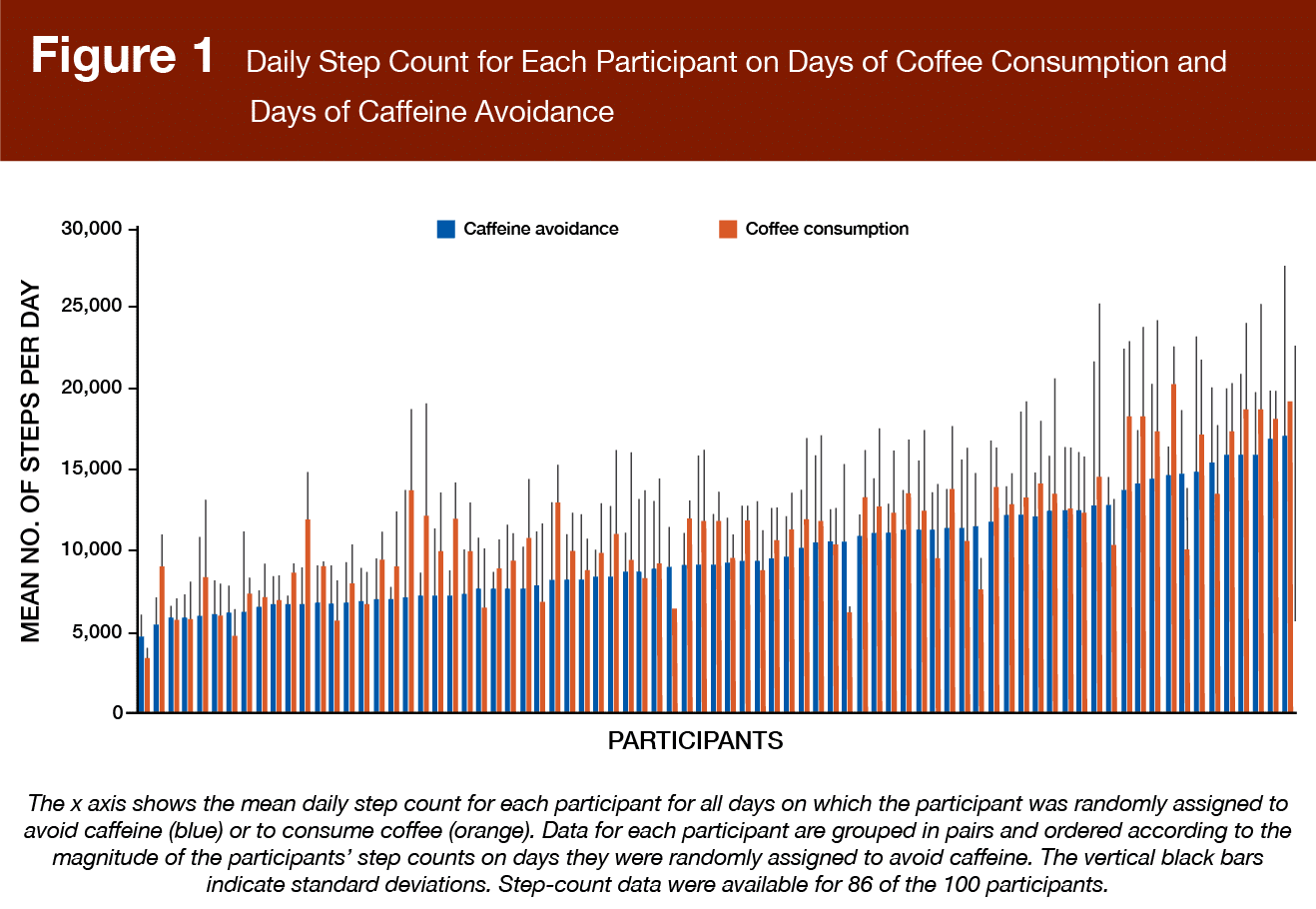

Members received much less sleep on espresso days (for a complete of 397 minutes per night time) than on caffeine avoidance days (for a complete of 432 minutes per night time). This imply distinction of ~36 minutes was statistically important (p < 0.05), with a 95% confidence interval starting from 25 to 47 minutes. These knowledge are offered in Determine 2.
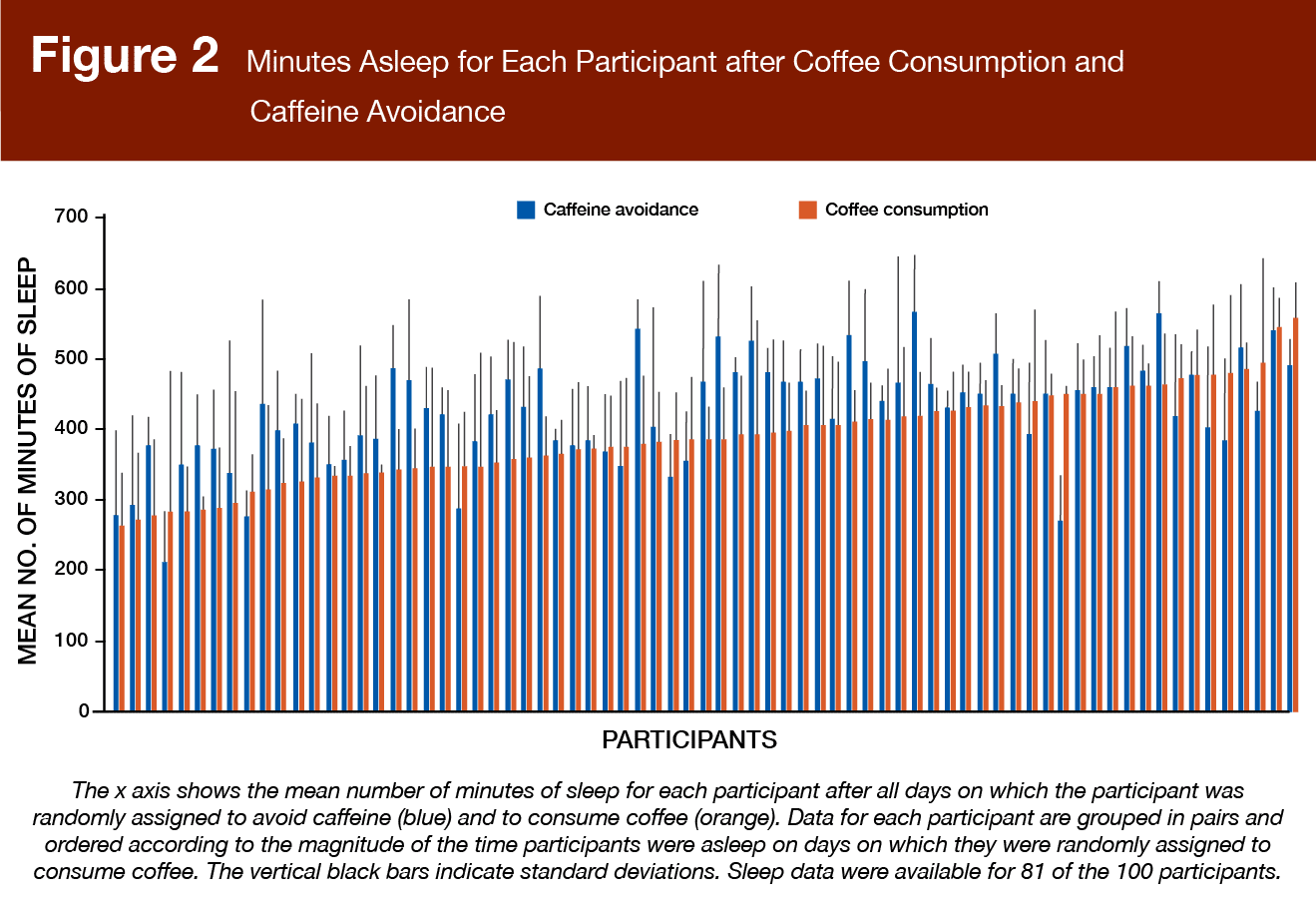

Common blood glucose ranges weren’t meaningfully impacted by espresso or caffeine avoidance. Common glucose ranges had been 95 mg/dL on espresso days and 96 mg/dL on caffeine avoidance days (imply distinction = -0.41 mg/dL; 95% CI, -5.42 to 4.60 mg/dL). In previous MASS articles (one, two), we’ve talked about how sure genotypes are related to sooner caffeine metabolism, whereas different genotypes are related to slower caffeine metabolism. Within the current research, these genotypes didn’t have a constant impression on outcomes. Members with sooner genotypes tended to have extra untimely ventricular contractions on espresso days, whereas contributors with slower genotypes tended to expertise bigger sleep reductions on espresso days. In different phrases, there was an inclination for quick metabolizers to have higher sleep-related outcomes, however worse heart-related outcomes. Genotype had just about no impression on step depend responses to caffeine.
Interpretation
We’ve offered the case “for” caffeine on many occasions inside the pages of MASS, and it’s a straightforward case to make. Firstly, folks love caffeine and the drinks that carry it. Throughout quite a few nations, the overwhelming majority of adults devour caffeinated drinks frequently as a result of they love the beverage itself or take pleasure in a fast vitality increase. As well as, meta-analyses point out that acute caffeine consumption improves a wide range of exercise-related outcomes together with endurance, power, and energy (5). On high of all that, the presently reviewed research means that caffeine consumption can increase the quantity of bodily exercise you accrue all through the day, which is mostly favorable for health-related outcomes. Nonetheless, in opposition to my higher judgment, my objective on this article is to current the case “in opposition to” caffeine.
Many lifters and athletes refuse to entertain the thought of ditching caffeine as a result of they’re hesitant to forego the ergogenic (performance-enhancing) impact of caffeine consumption. Whereas that perspective is comprehensible, there are legitimate causes to problem (or not less than query) the premise. Firstly, it’s essential to acknowledge that caffeine’s results on power and energy outcomes are typically modest in magnitude, with meta-analyses reporting Cohen’s d impact sizes within the 0.1 to 0.3 vary (5). That’s a good impact measurement for a dietary complement (provided that so few of them really work), nevertheless it’s definitely not going to make a game-changing impression in the long term. Talking of the long term, I’ve famous in a earlier MASS article that cross-sectional caffeine supplementation research report acute efficiency enhancements in routine caffeine customers (6). Nonetheless, there are only a few longitudinal research that truly quantify caffeine’s performance-enhancing results over an prolonged timeline of repeated use. One such research (7) was previously reviewed in MASS, and the outcomes hinted at diminished impact sizes over the course of 20 days. There’s additionally a obvious lack of research exploring the consequences of caffeine withdrawal on train efficiency. So, regardless of cross-sectional research reporting acute efficiency enhancement when routine caffeine customers devour pre-exercise caffeine (6), it’s typically tough to find out if caffeine is merely overcoming efficiency impairments induced by caffeine withdrawal signs. In such a state of affairs, caffeine could be restoring typical efficiency ranges moderately than elevating efficiency past a person’s typical degree. Primarily based on the shortage of direct proof associated to those concerns, it’s laborious to definitively conclude that routinely supplementing with caffeine earlier than train will meaningfully increase efficiency in the long term.
On a associated be aware, there are only a few research exploring persistent coaching diversifications in response to routine pre-exercise caffeine supplementation. Folks typically assume that caffeine should facilitate higher coaching diversifications over time as a result of it acutely enhances efficiency. Whereas it’s intuitive to imagine that acutely enhancing coaching efficiency will inevitably result in higher coaching diversifications over time, that’s not always the case. Some people draw conclusions about persistent caffeine consumption primarily based on multi-ingredient pre-workout supplement studies, however it is a dangerous extrapolation to make. Pre-workout dietary supplements sometimes include caffeine at the side of a number of different ergogenic elements, which makes it tough to discern the consequences attributable to caffeine itself. We previously reviewed a research (8) that instantly investigated the consequences of normal caffeine supplementation on persistent coaching diversifications. Whereas the outcomes leaned very barely in favor of the caffeine group (in comparison with the placebo group), the findings weren’t statistically important. In abstract, we nonetheless don’t know if persistent pre-exercise caffeine supplementation really improves coaching diversifications for lifters.
Whereas habituation is a crucial consideration for persistent caffeine use, sleep impairment is as effectively. Again in 2013, a research by Drake and colleagues (9) sought to find out how the timing of caffeine consumption impacts sleep high quality. Members both consumed no caffeine or consumed 400mg of caffeine 0, 3, and 6 hours previous to mattress. Outcomes indicated that caffeine impaired sleep high quality in any respect time factors measured. Whereas that is typically misinterpreted as suggesting that it’s best to cease consuming caffeine 6 hours earlier than mattress, the outcomes really don’t assist us decide when the “perfect” cut-off time could be. Realizing that caffeine impairs sleep 6 hours earlier than mattress doesn’t give us any proof indicating that sleep will not be impaired when caffeine is consumed 7 hours earlier than mattress. As reviewed in a earlier situation of MASS, a current meta-regression (10) offers way more sensible steerage concerning caffeine timing. As you may anticipate, Gardiner and colleagues discovered that caffeine dose impacted caffeine timing close to sleep disruption. They concluded that you just’d need to devour a 217.5mg dose not less than 13 hours earlier than mattress and a 107mg dose not less than 9 hours earlier than mattress, whereas smaller doses (<50mg) don’t appear to meaningfully impression sleep high quality. These findings are summarized in Determine 3. I consider it’s protected to imagine that these doses needs to be considered as cumulative in nature; in case you have 100mg at 9 a.m. and 100mg at 1 p.m., the “dose” at 1 p.m. could be larger than 100mg however decrease than 200mg, as solely a small portion of the 11 a.m. dose could be metabolized and cleared from the bloodstream by 1 p.m.
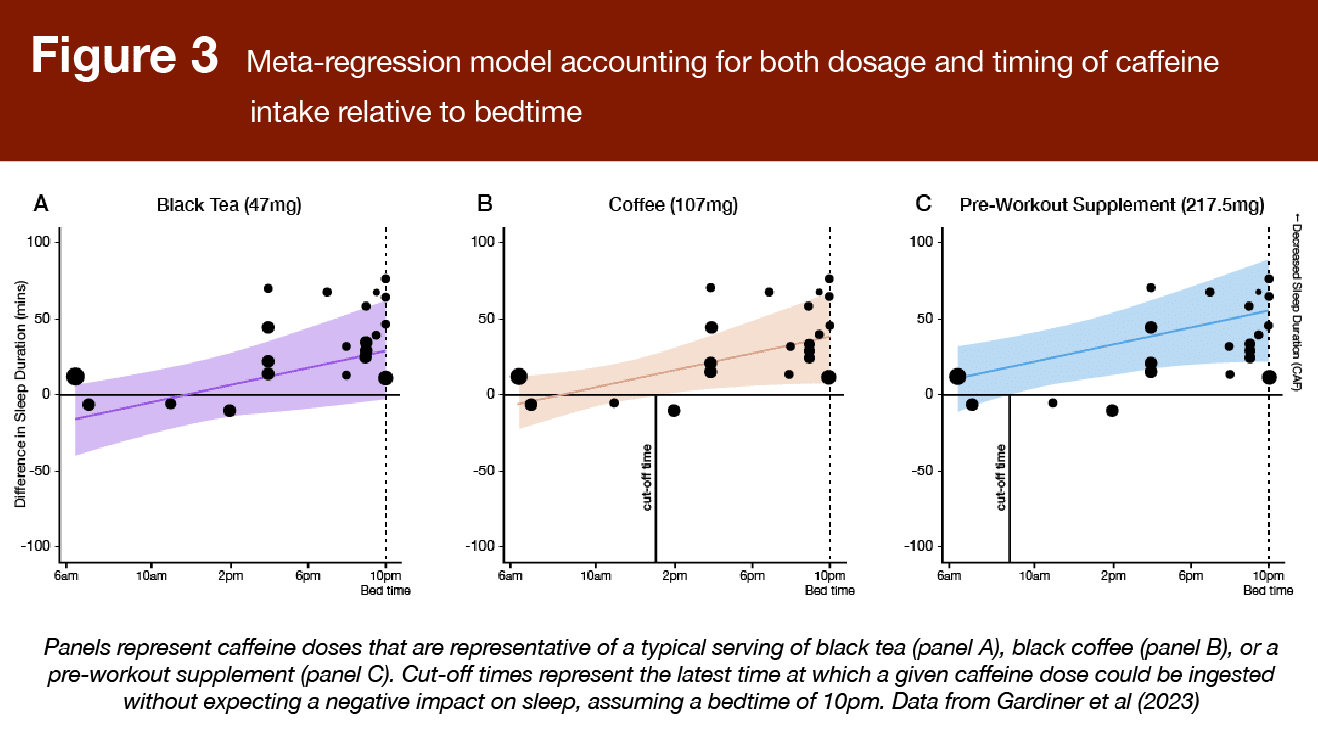

The presently reviewed research discovered constructive results on step counts, nevertheless it broadly reinforces considerations about caffeine consumption and sleep high quality impairment. Caffeine lovers typically downplay these considerations by leaning on considered one of two justifications: habituation or genotype. In case you dig into the supplementary supplies of the current research, you’ll discover partial help for these justifications. For instance, some folks counsel that they’re so habituated to caffeine’s wakefulness results that late-night caffeine consumption fails to impression their sleep. Within the current research, individuals who often consumed 1 or extra cups of espresso per day at baseline skilled a mean sleep discount of -28.9 minutes on caffeine days, whereas individuals who often consumed lower than one cup per day skilled a mean sleep discount of -52.6 minutes. This may occasionally not directly counsel that every day caffeine consumption attenuates, however doesn’t eradicate, unfavorable impacts on sleep. As well as, some folks counsel that they’re “immune” to caffeine’s results on sleep as a result of they’ve received the genotype related to sooner caffeine metabolism. Within the current research, people with intermediate and sluggish caffeine genotypes misplaced a mean of 34 and 47 minutes of sleep per night time (respectively) on caffeine days, whereas quick metabolizers skilled a imply improve of 33 minutes per night time. Nonetheless, I’m hesitant to conclude that the standard particular person can assume (hope) they’re a quick metabolizer and devour late-night caffeine with out sleep-related penalties for 2 causes. First, we’ve inadequate details about how a lot caffeine these people consumed and what time of day they consumed it. Second, there have been solely 13 contributors with “quick” genotypes. This will increase the chance of a spurious discovering, and in addition means that the overwhelming majority of contributors on this research (who’re, in concept, consultant of the inhabitants they had been sampled from) skilled worse sleep on caffeine days.
In terms of the heart-related outcomes reported on this research, I need to contextualize these a bit. I do know my objective on this article was to current a viable case in opposition to caffeine, however I don’t need to current a hyperbolic or alarmist argument. In case you’ve ever watched a TV present or film with a hospital scene, you’ve most likely seen somebody hooked as much as a coronary heart monitor, also referred to as an EKG (elektrokardiogramm) or ECG (electrocardiogram). The basic squiggly sample displays {the electrical} exercise of the guts, which dictates the coordinated rhythm and contraction of every heartbeat. The Q wave represents depolarization of the atrium, the QRS wave advanced represents the depolarization of the ventricle, and the T wave represents ventricular repolarization (you possibly can be taught extra about ECGs and coronary heart rhythms here). After we discuss coronary heart arrhythmias, we’re speaking a couple of disruption within the typical rhythm of the guts. In lots of circumstances, arrhythmias are transient and benign (this research noticed over 100 untimely ventricular contractions per day, on common), however they will generally result in probably life-threatening medical emergencies.
In case you comply with the information persistently, you generally come throughout stunning tales indicating that somebody died from a excessive, however not astronomically excessive, dose of caffeine (for example, 400-800 mg or so). Mounting proof means that people with a coronary heart situation referred to as “lengthy QT syndrome” are significantly inclined to harmful arrhythmias in response to caffeine consumption (11). Lengthy QT syndrome is strictly what it appears like – people with this situation have a longer-than-average QT interval, which is the size of time between their Q wave and T wave. Caffeine might lengthen QT intervals, which will be harmful for individuals who have lengthy QT intervals to start out with (12). All of that’s to say, until we’re speaking about an unintentional overdose from a misidentified powder or a very reckless try to deliberately over-consume caffeine, caffeine is unlikely to induce clinically related or extreme coronary heart arrhythmias in in any other case wholesome people. Nonetheless, folks with pre-existing coronary heart situations ought to seek the advice of with a professional clinician to find out a protected consumption vary for them.
To conclude this text, I need to share a quick anecdote. I’ve been a high-dose (≥400-500 mg per day) caffeine client for a few years, and I not too long ago stopped consuming caffeine totally. I used to be too sick to comfortably drink drinks for a number of days, so I figured I’d do some experiment if I used to be going to expertise caffeine withdrawal both approach. I’ve been off of caffeine for a couple of month now, and my observations have been fairly attention-grabbing. As somebody who is mostly liable to anxiousness, I’ve seen a dramatic discount in anxiety-related signs. I used to get complications if I consumed too little caffeine, however I additionally received complications if I consumed an excessive amount of caffeine. For sure, that’s not an issue anymore. I additionally noticed that I really feel the necessity to nap extra – on the floor that appears too apparent to be insightful, however I’ve come to understand that I had been undersleeping to a a lot larger diploma than I noticed, and caffeine was overlaying that up like a Band-Support.
When it comes to lifting efficiency, I haven’t seen something in any respect. At first it felt unusual to carry weights with no pre-exercise dose of caffeine, however I’ve come to understand that this was extra associated to the ritual and subjective expertise of caffeination than anything. I devour caffeine earlier than exercises as a result of it’s what I’ve at all times achieved (for a lot of, a few years). In consequence, I’ve subconsciously related the subjective feeling of “peak caffeination” as the sensation of being ready to carry. This psychological hyperlink has traditionally led me to really feel unprepared to carry after I’m not caffeinated, however pushing by uncaffeinated exercises has opened my eyes to the truth that caffeine wasn’t doing an excessive amount of for my exercises within the first place.
We’ve strengthened the significance of sleep many times in earlier MASS points, with analysis collectively indicating that sufficient sleep will be essential for efficiency, physique composition, urge for food regulation, subjective wellness (typically feeling good), and a wide range of different outcomes. We’ve additionally talked about the idea of expectancy results (one, two), like after we anticipate a placebo to have constructive results or anticipate a nocebo to have unfavorable results. In my time away from caffeine, I’ve come to search out that caffeine’s web impression on my health progress was most likely impartial at greatest – the potential advantages, which can be inclined to some extent of habituation, got here with the downside of insufficient sleep high quality. I’ve additionally noticed that lots of the advantages I beforehand related to caffeine had been most probably influenced by my expectations; I tended to overestimate caffeine’s constructive results and exaggerate the hypothetical downsides of not consuming caffeine. A lot to the dismay of the high-powered advertising and marketing machine that dictates my each transfer, I’m not going to make the flashy declare that ditching caffeine will change your life, or that caffeine abstention is the one bizarre trick you’re lacking out on. Nonetheless, I’d encourage you to ask your self a number of questions:
Do you’re feeling higher whenever you devour caffeine, or does caffeine aid you keep away from unhealthy emotions (e.g., complications, drowsiness, and many others.) which might be attributable to caffeine within the first place? Are you really sleeping effectively sufficient, or is caffeine masking the indicators of inadequate sleep? Does caffeine meaningfully enhance your efficiency, or have you ever come to anticipate poor efficiency whenever you’re not caffeinated? Do you may have any predispositions (e.g., nervousness, sluggish caffeine metabolism, sleep points, coronary heart arrhythmias, or household historical past of coronary heart situations) that make you query your present degree of caffeine consumption?
Don’t get me fallacious – most individuals devour caffeinated drinks often and tolerate them fairly effectively. They really feel nice, carry out effectively, and expertise completely no adversarial outcomes associated to their caffeine consumption. Nonetheless, for some share of the human inhabitants, caffeine avoidance is perhaps preferable compared to common caffeine consumption. In different phrases, caffeine is completely high-quality for most individuals, nevertheless it’s not for everybody, and it’s not with out potential drawbacks. I by no means imagined I’d say this, however I a lot want the decaffeinated life primarily based on the way it makes me really feel on a day-to-day foundation. I really feel much less anxious, well-rested, and able to carry out (mentally and bodily) in any respect hours of the day, and I by no means discover myself feeling unprepared for a psychological, social, or bodily activity as a result of I haven’t had my espresso but.
However sufficient with the anecdotes – let’s wrap this up by summarizing the proof. Within the presently reviewed research, caffeine was related to some professionals and a few cons. On the brilliant aspect, folks had been extra bodily lively and accrued extra steps per day on caffeine. Nonetheless, caffeine consumption led to sleep impairment and elevated frequency of coronary heart arrhythmias. Caffeine will not be inherently unhealthy for you, and most of the people will expertise no significant enhancements of their well being, wellness, or efficiency in the event that they cut back from two every day cups of espresso to zero. Nonetheless, in case you have been identified with a coronary heart situation (or suspect that you just might need an undiagnosed coronary heart situation), it’s best to test with a professional healthcare skilled to completely discover the matter and decide an acceptable caffeine consumption degree to your state of affairs. In case you’re experiencing points that might probably be associated to caffeine (e.g., complications, poor sleep, anxiousness, and many others.), or when you’re merely getting approach out of hand together with your every day caffeine dosage, it is perhaps time to ask your self the questions listed on this article to find out if a caffeine-free experiment is a worthwhile pursuit.
Subsequent Steps
Surprisingly sufficient, we nonetheless have lots to find out about caffeine. I’d prefer to see extra experimental analysis pertaining to how totally different caffeine doses and timing methods impression sleep, and the way we are able to clarify totally different subjective experiences (i.e., some folks counsel that caffeine has no impression on their sleep, whereas others report being extremely delicate to it). I’m significantly serious about discovering out if these divergent impacts on subjective sleep high quality are associated to price of caffeine metabolism, habituation amongst common caffeine customers, inaccurate self-assessments of sleep high quality, or one thing else totally. On the health aspect of issues, I believe we want a number of longitudinal research to look at how caffeine’s results on power and energy change over time and the way caffeine withdrawal impacts train efficiency. These kinds of research could be excellent for a grasp’s-level thesis challenge or as a part of a multi-study doctoral dissertation – they handle an easy query and could possibly be accomplished with very modest budgets and comparatively quick research timelines. Lastly, it’d be nice to see extra longitudinal research that truly quantify caffeine’s results on persistent coaching diversifications moderately than acute efficiency metrics.
Utility and Takeaways
Caffeine acutely improves efficiency and should passively result in increased bodily exercise ranges. Nonetheless, caffeine can impair sleep, and its results on long-term coaching diversifications are at present unsure. As well as, caffeine can worsen nervousness signs and result in clinically related arrhythmias in folks with pre-existing coronary heart situations. Caffeine isn’t inherently unhealthy, nevertheless it’s not for everyone. Caffeine consumption habits needs to be individualized to suit your objectives, preferences, subjective experiences, and medical concerns.
Get extra articles like this
This text was the duvet story for the February 2024 situation of MASS Analysis Assessment. In case you’d prefer to learn the complete, 93-page publication (and dive into the MASS archives), you possibly can subscribe to MASS here.
Subscribers get a brand new version of MASS every month. Every situation contains analysis evaluate articles, video displays, and audio summaries. PDF points are normally round 100 pages lengthy.
References
- Marcus GM, Rosenthal DG, Nah G, Vittinghoff E, Fang C, Ogomori Ok, et al. Acute Effects of Coffee Consumption on Health among Ambulatory Adults. N Engl J Med. 2023 Mar 23;388(12):1092–100.
- Mitchell DC, Knight CA, Hockenberry J, Teplansky R, Hartman TJ. Beverage caffeine intakes in the U.S. Meals Chem Toxicol. 2014 Jan;63:136–42.
- Fredholm BB, Bättig Ok, Holmén J, Nehlig A, Zvartau EE. Actions of caffeine in the brain with special reference to factors that contribute to its widespread use. Pharmacol Rev. 1999 Mar;51(1):83–133.
- Reyes CM, Cornelis MC. Caffeine in the Diet: Country-Level Consumption and Guidelines. Vitamins. 2018 Nov 15;10(11):1772.
- Grgic J, Grgic I, Pickering C, Schoenfeld BJ, Bishop DJ, Pedisic Z. Wake up and smell the coffee: caffeine supplementation and exercise performance-an umbrella review of 21 published meta-analyses. Br J Sports activities Med. 2020 Jun;54(11):681–8.
- Carvalho A, Marticorena FM, Grecco BH, Barreto G, Saunders B. Can I Have My Coffee and Drink It? A Systematic Review and Meta-analysis to Determine Whether Habitual Caffeine Consumption Affects the Ergogenic Effect of Caffeine. Sports activities Med. 2022 Sep;52(9):2209–20.
- Lara B, Ruiz-Moreno C, Salinero JJ, Del Coso J. Time course of tolerance to the performance benefits of caffeine. PLoS ONE. 2019 Jan 23;14(1):e0210275.
- Giráldez-Costas V, Ruíz-Moreno C, González-García J, Lara B, Del Coso J, Salinero JJ. Pre-exercise Caffeine Intake Enhances Bench Press Strength Training Adaptations. Entrance Nutr. 2021 Jan 26:8:622564.
- Drake C, Roehrs T, Shambroom J, Roth T. Caffeine effects on sleep taken 0, 3, or 6 hours before going to bed. J Clin Sleep Med. 2013 Nov 15;9(11):1195–200.
- Gardiner C, Weakley J, Burke LM, Roach GD, Sargent C, Maniar N, et al. The effect of caffeine on subsequent sleep: A systematic review and meta-analysis. Sleep Med Rev. 2023 Feb 6;69:101764.
- Grey B, Ingles J, Medi C, Driscoll T, Semsarian C. Cardiovascular Effects of Energy Drinks in Familial Long QT Syndrome: A Randomized Cross-Over Study. Int J Cardiol. 2017 Mar 15;231:150–4.
- Shah SA, Szeto AH, Farewell R, Shek A, Fan D, Quach KN, et al. Impact of High Volume Energy Drink Consumption on Electrocardiographic and Blood Pressure Parameters: A Randomized Trial. J Am Coronary heart Assoc. 2019 Jun 4;8(11):e011318.
[ad_2]
Source link


